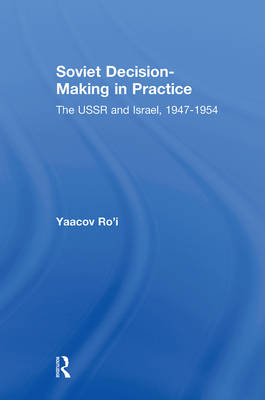
- Retrait gratuit dans votre magasin Club
- 7.000.000 titres dans notre catalogue
- Payer en toute sécurité
- Toujours un magasin près de chez vous
- Retrait gratuit dans votre magasin Club
- 7.000.0000 titres dans notre catalogue
- Payer en toute sécurité
- Toujours un magasin près de chez vous
Description
The Soviet Union executed an apparent about-face in its traditional anti-Zionist position when the Palestine issue came before the United Nations in 1947. In addition to political support at the UN from May 1947 to May 1949, important military assistance was rendered to the Jewish Palestinian Yishuv throughout 1948 by the Eastern bloc. Toward the end of that year, however, indications of change became apparent, and the Soviet Union began criticizing Israel.
This book studies the USSR's attitude toward the establishment of a Jewish state in Palestine in the immediate post-World War II period and toward Israel in the first years of its existence, and it investigates the complex of considerations that caused the initial apparent reversal of traditional Soviet anti-Zionism. The author contends that this support for Israel contributed considerably to the evoking of Soviet Jewry's enthusiastic reaction to the establishment of the State. But this very reaction resulted in turn in Moscow changing its tactics again, since it could not allow its Jewish citizens to identify with a state outside the Soviet Union and the Communist orbit.
During the few years after the Israeli War for Independence, in which the Arab-Israeli conflict was relatively low key, the USSR adopted a position of seeming neutrality between two sides while quietly wooing the Arab nations. Ro'i examines how toward the end of the Stalin period the Jewish problem again intervened with the infamous' 'Doctor's Plot," and how early in 1953 the Soviet Union severed diplomatic relations with Israel. One year later the USSR cast its first two pro-Arab vetoes in the UN Security Council, and from this point on Soviet-Israeli relations openly became a function of the increasingly cordial Soviet friendship with the Arab world.
Spécifications
Parties prenantes
- Auteur(s) :
- Editeur:
Contenu
- Nombre de pages :
- 540
- Langue:
- Anglais
- Collection :
Caractéristiques
- EAN:
- 9781138514904
- Date de parution :
- 09-08-18
- Format:
- Livre broché
- Format numérique:
- Trade paperback (VS)
- Dimensions :
- 152 mm x 229 mm
- Poids :
- 999 g

Les avis
Nous publions uniquement les avis qui respectent les conditions requises. Consultez nos conditions pour les avis.






